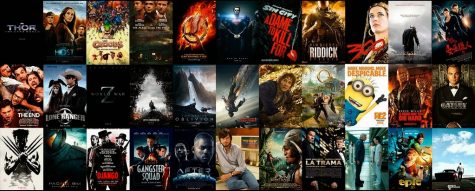The death of the art of cinema
December 7, 2016
Movies have been a form of entertainment for years, but for some they serve a greater purpose. Movies are a form of expression and art letting us experience a story. The first movie was made roughly 115 years ago by Thomas Edison, so in the grand scheme of human development, movies are relatively new. But is the death of cinema already here?
“I don’t think its the death of cinema, but I think popular cinema isn’t what it used be,” said Christie McGraw, a Milford High School Great Works teacher who teaches students the art of film.
Movies have started to seem like they’re just made to be money makers with sequels of movies like Transformers being regurgitated and put on to the big screen every year. Some audiences would agree that they’re terrible movies, but they still make money.
There’s some people who actually like these movies. Those people just want something to pass time or something easy to watch and will go to see simplistic cliches but others may want to see something emotionally gripping. And sadly, it seems like the ones less concerned about a plot outweigh those who are looking for something that took effort to create.
Hollywood is seeing all these action-packed films making billions and many want in. Marvel made a cinematic universe that brought in all kinds of money, so DC Comics saw this and tried to do the same things. Hollywood produces these movies with hiring big names and spending lots on marketing. We don’t get to hear about smaller movies and it all boils down to value. “It’s all a money game,” said McGraw.
Not as many people will see a Wes Anderson movie as a Michael Bay movie because most mainstream audiences don’t even hear about them. Hollywood doesn’t want to take risks. They want money makers not history makers.
Wes Anderson’s Grand Budapest Hotel, one of the best movies of 2014, had a 97% on Rotten Tomatoes made over 170 million. That may sound a lot but when Transformers: Age of Extinction (2014) makes 1.104 Billion and has a score of 18%, something is wrong.
Calling it the death of film is a stretch. If you want a good movie, you just have to look for it.
“Film used to be about much more about plot driven and message driven and making artistic strides and now is special effects and entertainment value driven,-” said McGraw. Not all of the blame can be put on Hollywood, sometimes audiences just don’t want to have to think. They just want to escape.
Some directors make a movie without worrying about its possible controversy with its topic. Among McGraw’s list of favorite directors are Quentin Tarantino, Wes Anderson, and David O’Russell, and Sam Mendes stood out. “For someone like Sam Mendes that pushes an idea symbolism and meaning even if it’s controversial,” she said. “He cares more about the message he’s sending even if it’s not going to be received well.” Directors like this are important because they don’t just give the audiences what they think they want, they give what the audience needs to see.
McGraw said there is hope for film in the future, “If we support independent filmmakers and independent movie theaters.” She said audiences need to, “start spending money on directors we’ve never heard of collectively.”
Rylin Darrow, an MHS Junior, loves the art of cinema. “Movies have become toy commercials now. A lot of stuff is just added to look cool when it adds nothing to the story,” said Darrow. He believes kids need to start realizing action isn’t good for the sake of action, it’s good when it has depth and characters you care for. “When a kid is told something is cool, they’ll believe it, so parents just have to show them how cool story driven movies can be.”
“It’s not the death of cinema, it’s the slow death of the art of cinema,” said Darrow.
It is up to parents to help send film in the right direction. Parents have to teach kids about this. They learn about drawing and painting, so why not film?









